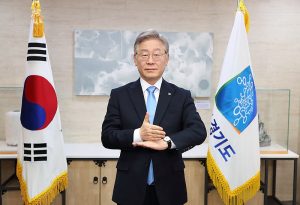South Korea will elect its 20th president on March 9, 2022. Lee Jae-myung, the current governor of Gyeonggi province, was recently selected as the presidential candidate for the ruling Democratic Party of Korea. He defeated his rival Lee Nak-yon, a former prime minister, by a margin of 11 points in the primaries, which ended on October 10.
Since foreign policy issues are not normally at the epicenter of South Korea’s presidential campaigns, little was known about Lee Jae-myung’s vision for foreign affairs and diplomacy until he expressed his views on inter-Korean and foreign relations in a statement titled “Unification and Diplomacy Initiative in the Era of Great Transformation” on August 22 (full text in Korean available here; a summary in English is here).
The keyword that runs through Lee’s initiative is “practical.” On inter-Korean relations, he claims that since most of the population in both North and South Korea is a generation removed from the experience of the Korean War, it is impossible to obtain popular consent for unification under the traditional logic of the two nations sharing a single ethnicity. More broadly, he diagnoses that political, economic, and military confrontation over the Korean Peninsula will escalate as the strategic competition between the United States and China intensifies. Therefore, Lee argues that inter-Korean and foreign relations should be approached practically, without ideological considerations.
On North Korean denuclearization, Lee asserts that “snapback” sanctions – the automatic reimposition of sanctions to punish noncompliance – and simultaneous step-by-step action are “realistic and practical for both North and South Korea” because a “big deal” or a grand bargain is unlikely to succeed. To that end, Lee pledges to make a concrete proposal to North Korea and the United States upon becoming president. He further insists that “we need to create a pragmatic relationship that is conducive to the economic development and the livelihood of the people of the two Koreas.”
The same practical approach is true of Lee’s broader foreign policy. He argues that there is no reason to limit South Korea’s room for maneuver by choosing either China, its largest trading partner, or the United States, its only treaty ally. He emphasizes that competent diplomacy should aim to make both Washington and Beijing seek closer cooperation with Seoul. He believes South Korea has the ability to leverage its position because both the United States and China need South Korea for their competition in high-tech fields such as semiconductors and EV batteries. Lee also vows to pursue pragmatic diplomacy in Japan-South Korea relations through a two-track strategy centered on national interests, where sensitive historical issues are separated from other areas of cooperation.
How much should Washington policymakers read into Lee’s stated intention to pursue a middle course between the United States and China and a rapprochement with North Korea? His “Unification and Diplomacy Initiative” is, after all, a campaign document with few specifics, designed to win the election and garner support from the broader public. His policies as president may be very different.
In his initiative, there is a clear attempt to satisfy both conservatives and progressives. For example, while claiming he will carry on the Moon Jae-in administration’s North Korea policy, Lee also asserts that he will strongly request North Korea to change its wrong practices and attitudes and will officially protest when North Korea perpetrates wrongdoings. This stance is what Korean conservatives, critical of their progressive counterparts’ unconditional engagement with the North, have been demanding for decades. However, any forward-leaning criticism is likely to elicit a strong response from North Korea. Moreover, it may collide with Lee’s goal of playing “a more active mediator and problem solver role than the Moon Jae-in administration.”
How likely is Lee’s a realpolitik approach to obtain results? If elected, Lee will not be the first South Korean president to attempt a “practical” approach to North Korea. In 2008, then President Lee Myung-bak said in his inaugural address that “inter-Korean relations should develop more productively than ever before. We will solve it according to the standard of practicality, not the standard of ideology.” But, as subsequent developments proved, he couldn’t achieve any progress. This past experience exposes the limitations of applying a practical approach to inter-Korean relations, which involves competing systems and ideologies. The pull toward tension and conflict is stronger than peace and reconciliation.
The same is true of the South Korea-U.S. alliance. Applying the standard of pragmatism to the alliance, which is often characterized as a union of blood and values, is likely to cause more problems than benefits. In the short term, Lee’s stated desire to chart a middle course for South Korea between the United States and China may prove useful. Yet the reality of deepening regional conflict between the two big powers is still likely to force South Korea to make a choice.
Lastly, given Lee’s background as a labor rights lawyer and advocate for minority groups, it is somewhat unfortunate that he didn’t include a single word about human rights in North Korea in his “Unification and Diplomacy Initiative.”

































